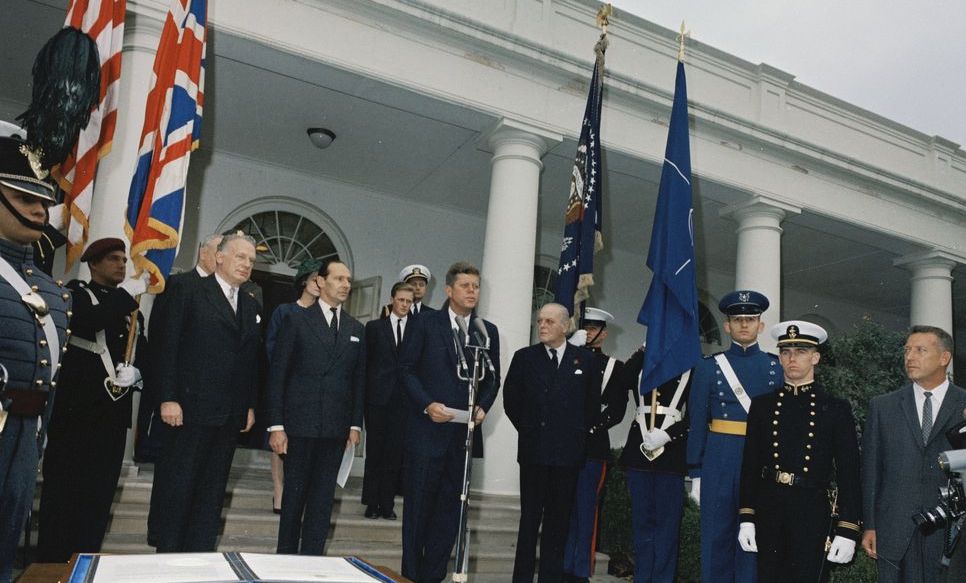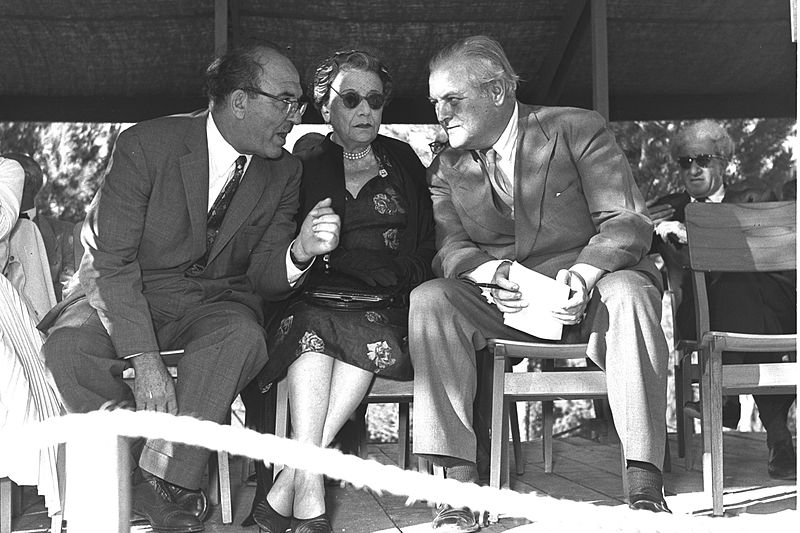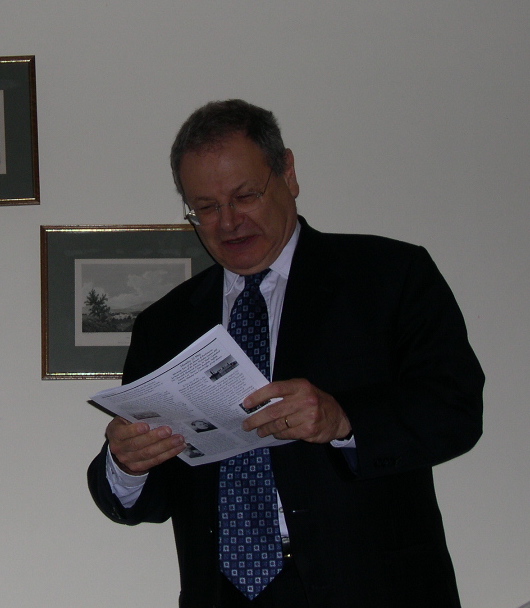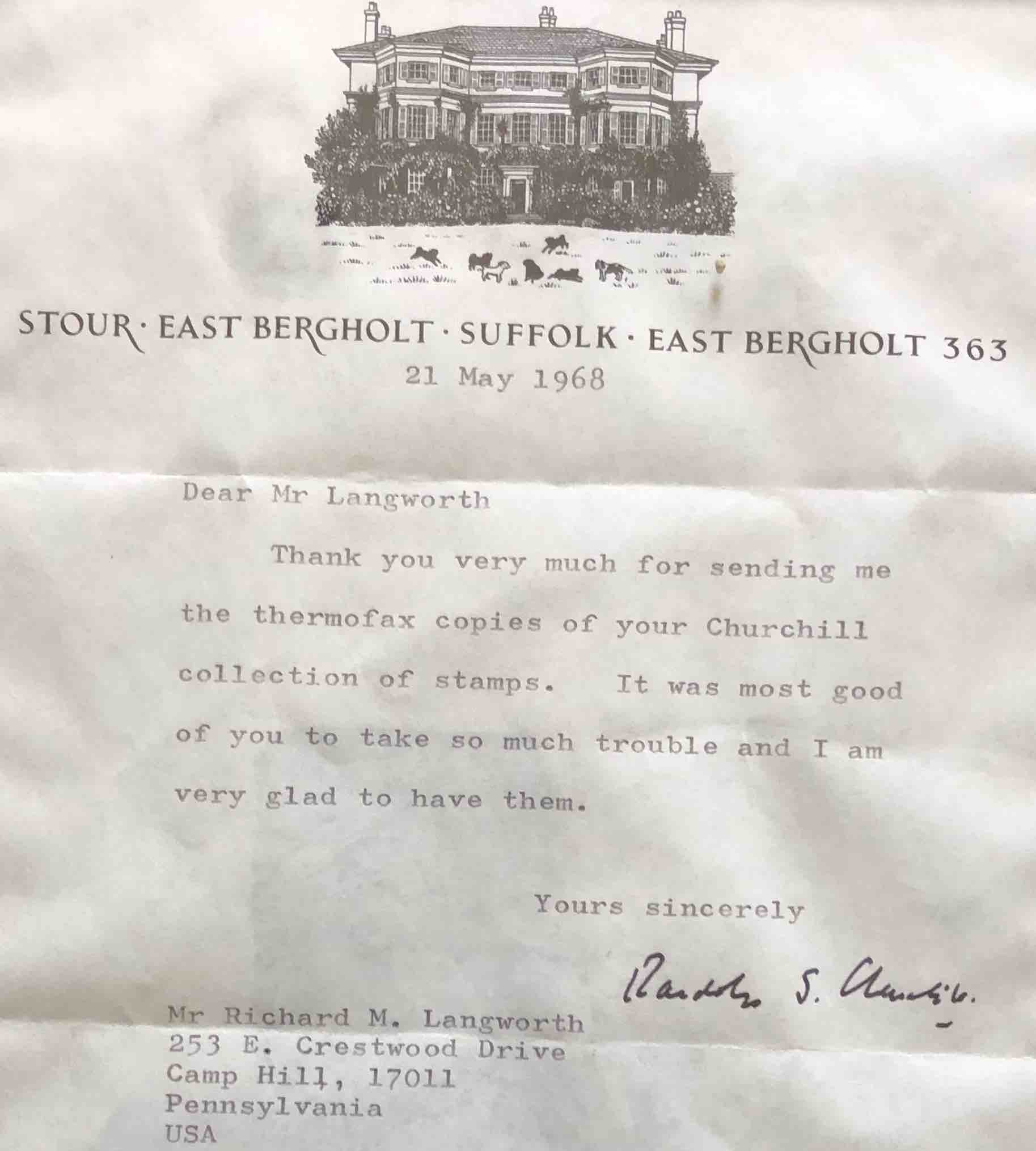
Present at the Creation: Randolph Churchill and the Official Biography (3)
“Randolph Churchill: Present at the Creation,” is from a lecture aboard the Regent Seven Seas Explorer on the 2019 Hillsdale College Cruise around Britain, 8 June 2019. Concluded from Part 2.
“The Great Work” —Randolph S.C.
After the war, Churchill willed his archive to Randolph. In 1959, impressed by his son’s biography of Lord Derby, he invited Randolph to be his biographer. Randolph devoted himself to the job, knowing by then that he had wrecked his body, that the process of disintegration was advanced. Could he finish in time? Randolph wondered.
He housed the archives in a fireproof strong room at Stour, his home in Suffolk. His team of assistants, whom he called his “Young Gentlemen,” would research the papers and have them typed in triplicate. Then they would read the typed version to him, standing at an upright desk which had once belonged to Disraeli. As they read, he would fire questions which they would jot down in the margin to be answered later.
“Young Gentlemen”

In 1962 young Martin Gilbert came to Stour with a letter of introduction from Lady Diana Cooper: “Darling Randy, Here is Martin Gilbert, an interesting researching historian young man, who loves Duff and hates the Coroner. He is full of zeal to set history right. Do see him.” The Coroner in her letter was Neville Chamberlain. Martin Gilbert remembered:
It was at Stour, and under Randolph’s gaze, that I learned much about history, and even more about Churchill. The method of work was rigorous. “I hope, dear boy, you will be a bitter ender?” he once asked me.” My work sent me back to Oxford in 1967, but I absorbed a great deal….
I learned at Stour that history was concerned with character and humanity, as well as with facts and achievements….Research at Stour was as far from any dry-as-dust archive or ivory tower as one could imagine. [The questions led me] into a realm I had hardly visited during my undergraduate years at Oxford, the personalities, governments and wars of late Victorian England. After each hour or so of reading, I was expected to disappear, bury my head in the reference books, and emerge with all the answers in place. Sometimes I hardly knew the meaning of the questions, let alone how to tackle them.
24/7
Work occurred all the time: at breakfast, after lunch, before dinner, late evening, the wee hours. Randolph, Martin wrote, never tired of asking questions and demanding answers. “Why have you taken so long, dear boy?” was a frequent complaint, “even when it seemed to me that I had been extremely quick. I did my best, but often floundered. Michael Wolff, whose task was to ensure that volume one of the biography, from Churchill’s birth in 1874 to his escape from a Boer prisoner-of-war camp in 1900, was ready for the printer within two years, was often as exasperated as Randolph by my lack of knowledge.”
A fine historian in his own right, Michael Wolff later wrote a stunning foreword to Churchill’s Collected Essays, a now-rare, four volume collection of articles not republished in his books. The Essays are among the least known of Churchill writings. Combined with many other forgotten essays in the Ronald Cohen Collection at Hillsdale College, they form an almost unknown part of Churchill’s canon which will prove invaluable for future scholars.
Rigors of research
Another of Martin Gilbert’s tasks at Stour was to prepare biographical notes for everyone mentioned in Churchill’s letters. This meant: those he wrote to, those he mentioned—anyone referred to by name or the office they held. “Randolph wanted accuracy and detail: at least four or five lines for every person, however obscure….
Every day’s work at Stour was an exploration for me. During my three days each week in Oxford doing my own researches on the roots of appeasement [The Appeasers, Martin’s first book], I began to welcome the moment when I would be on my way back to Stour, and to the biographical queries. Slowly at first, it seemed to me—and to Randolph far too slowly—I began to master the world of reference books. How cross Randolph could be, in those early days, when I revealed ignorance….
Within a few months Martin learned how to follow up the thinnest clue. “Every fragment about a person could be put with another fragment and built up into three or four lines of detail, if one knew where to look.” He found helpful libraries and institutions and answered many obscure or difficult queries through correspondence.
Randolph: a personal remembrance
I envy Martin’s experience. Alas two or three letters from Randolph Churchill are all of which I can boast. In May 1968, swept away in part by his volumes, I founded the Churchill Study Unit, devoted to collectors of Churchill commemorative stamps. I wrote to him at Stour, asking if he could help identify the more puzzling postal images. He replied instantly. “I regret to record I know nothing about stamps, but I shall be pleased to assist in any way.”
Martin, a stamp collector, said he remembered my letter’s arrival, and Randolph’s interest. It was a very small gesture. He didn’t even have to answer. Alas, two weeks later, Randolph was dead. My encounter led to a friendship with his son, Winston who took his place as our first honorary member. Like Martin, he was devoted to Randolph as a mentor and inspiration.

In 2006, hosting a Churchill Tour of England, Barbara and I brought our party to Stour by kind invitation of its owners, Paul and Birte Kelly. Martin Gilbert joined us, his first visit since Randolph had died. Tears streaming down his face, he relived his memories. “Gone, alas, like our youth, too soon.”
Life at Stour
One sees Stour as a quintessentially English country house, the furnishings traditional, comfortable, a bit frowzy at the edges. Captain Boycott, the spoiled pug, was never fully housebroken… Lady Diana Cooper, magnificently gowned, occupies the sofa of an evening, sniffs vaguely at the cushions. Randolph provides guests with the best fare—“a notable soup”— though he himself has long lost interest in eating. The gardens are lovingly tended—sometimes too lovingly. (Randolph once applied so much fertilizer that the grass turned black.) The garden strong room is stacked high with Churchill’s archive. Here Randolph directs other searchers for the truth, leaving the key in the door and the visitor alone.
Many have wondered how Martin Gilbert lasted so long with this mercurial character. Part of it had to be that Randolph was intensely interesting. “Aside from his heroically dismal manners, his gambling, arrogance, vicious temper, indiscretions, and aggression,” Andrew Roberts wrote, he “was generous, patriotic, extravagant and amazingly courageous.”
“Randolph’s Day”
Kay Halle’s book, The Young Unpretender, offers many fine portraits of Randolph. I think the best is by Jacqueline Kennedy Onassis. She recalled 9 April 1963, “the spring day after rain,” when President Kennedy proclaimed Sir Winston an honorary American citizen.
“We met in Jack’s office,” she wrote. “Randolph was ashen, his voice a whisper. “All that this ceremony means to the two principals,” I thought, “is the gift they wish it to be to Randolph’s father—and they are both so nervous it will be a disaster.”
Jack spoke first but I couldn’t listen. Then the presentation. Randolph stepped forward to respond: ‘Mr. President.’ His voice was strong. He spoke on, with almost the voice of Winston Churchill. He sent his words across the afternoon, that most brilliant, loving son—speaking for his father. Always for his father. But that afternoon the world stopped and looked at Randolph. And many saw what they had missed….I will forever remember that as Randolph’s Day.
There weren’t many days left. Randolph’s doctor told him that more hard liquor would kill him in six months. He stopped cold, but it wasn’t enough. On the evening of 5 June 1968, he heard they had the man who shot Robert F. Kennedy. “Good, good,” he replied, “but have they caught he fellow who’s done me in?”
Randolph and Bobby both died the next day, June 6th. Filling out Randolph’s death certificate, his doctor didn’t how to state the cause: “With Randolph the answer is: everything. He’s worn out every organ in his body at the same time.”
His son wrote: “We buried him in Bladon churchyard, beside his grandfather, and his father, whom he loved and revered so deeply. To this day the memory of him lingers on in the hearts of his friends.”
“Despite everything…”
 Since receiving his letters, I have always been among Randolph’s admirers—and yes, in Martin Gilbert’s words, “despite everything.” True, he drank—up to two bottles of whisky a day, his son said. True, he divorced twice; there were many romances outside the sanctity of marriage. His last, with Natalie Bevan, lasted from 1957 to the end of his life. But she was a singular woman who brooked no nonsense from him, thereby earning his utter devotion.
Since receiving his letters, I have always been among Randolph’s admirers—and yes, in Martin Gilbert’s words, “despite everything.” True, he drank—up to two bottles of whisky a day, his son said. True, he divorced twice; there were many romances outside the sanctity of marriage. His last, with Natalie Bevan, lasted from 1957 to the end of his life. But she was a singular woman who brooked no nonsense from him, thereby earning his utter devotion.
He achieved nearly 5000 pages on his father’s early life—captivating pages, structured perfectly. That was Randolph’s contribution. Professor Antoine Capet wrote: “What strikes me as extraordinary is that the Hillsdale volumes have (very appropriately) kept the type of document headings initiated by Randolph over 50 years ago—and the same pagination in the reprinted volumes.”
“Randolph, Hope and Glory,” as detractors referred to him, emerges as a dynamic speaker, a brilliant journalist, a gallant soldier, a skilled biographer, a frustrated son, and, in the end, an honest man, as honest about himself as he was of others. Not so bad a eulogy, after all. I think he would settle for that.
His enemies condemned him for insensitivity, arrogance and egotism. Every great figure who ever lived was at times insensitive, arrogant and egotistic. Their greatness was that they gave far more than they took for themselves. By this measure Randolph Churchill was great. Those who knew him best missed him the most. His epitaph might be the words he wrote of his father’s friend, Brendan Bracken:
Despite the ups and downs I had with him over 35 years, I have no hesitation or lack of breath in this valedictory fanfare: “You were always on the good side. You loved truth and honour. You hated cruelty and injustice. Fare thee well, my gifted, true and many-sided friend.”







One thought on “Present at the Creation: Randolph Churchill and the Official Biography (3)”
Your excellent article mentions Evelyn Waugh in passing but not his very close association with Randolph during and oon after WW2, as revealed in Waugh’s published Diaries and Autobiography. Randolph and Waugh trained together as Commandos in Scotland, and then soldiered together in North Africa and Yugoslavia.
–
Randolph-Waugh repartee is world famous, notably Waugh’s announcement (to the bar at White’s, after Randolph’s operation for a benign tumor: “Leave it to modern medical science to cut out of Randolph the only bit that was not malignant.” RSC, amused as always, sent the devout Catholic Waugh an Easter card, wishing him a “Happy Resurrection.” Sir Fitzroy Maclean, who served with them both in Yugoslavia, told me many other anecdotes, mostly unprintable. Hoping to get Randolph to stop dominating the conversation, they bet him that he couldn’t read the Bible through without saying a word. Randolph didn’t get through Genesis before exclaiming, “God–isn’t God a s—!” (My remembrance of Fitzroy is here.) -RML
Comments are closed.